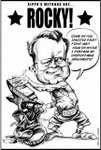Martin Luther: The Man and the Image
By Herbert David Rix
By far and away, the best book written on Matin Luther in the 20th Century was "Martin luther: The Man and the Image" by Medieval scholar and Erasmus expert Herbert David Rix. It was published by a small independant New York press Irvington Publishers in 1983. It did not receive much press. I obtained a used copy in a small bookshop in Oxford, UK in 1989. I had never heard of it before, but as I glanced through it in the shop, I knew it was a must read. My expectations were more than realized. it was essentailly a life-changing book and I used it as the basis for an extended lecture on Martin Luther entitled "The Death of Charity" which I delivered to the Pro Fide Forum at Westminster Cathedral in London in October 1989.
Dr. Rix did an extended survey of Luther's works from the Weimar Edition of Luther's collected works. He also did a survey of the various analyses of Luther's personality and work by his 16th Century contemporaries and by scholars since the Quadricentenniel of his birth in 1883. Rix makes several connections in the timeline of Luther that I have not seen documented in other biographical materials. He also gives a plusible (if somewhat dated) psychological profile of the heretic using pre-DSM3 categories.
In short, Dr. Rix thinks that Luther suffered from a severe manic-depressive disorder puncutated with periods of extreme mania that bordered on the psychotic and characterized by a poor self image, severe depression, and delusions of grandeur. In this view he was not alone. he quotes from previous authors who wrote about Luther including Erasmus, Richard Simon, Preserved Smith, Fr. Heinrich Denifle, Fr. Hartman Grisar, Preserved Smith, Paul Reiter, and Eric Eriksson.
Based on his masterful summary in this book, it is abundantly clear that Luther was suffering from severe mental illness and that ths illness lay as the foundation of his alleged religious "breakthrough." To put it bluntly, the theological foundation of Protestnatism is mental illness. Luther's amoral and antinomian heresy of "justification by faith alone unformed by charity and without good works" was a personal catharsis which the heretic used to control his periods of depression.
EVERY CATHOLIC APOLOGIST MUST READ THIS BOOK!
This book has been out of print for over a decade, but now Google Play has a PDF version of it that is available here for $16.50! It would be cheap at twice the price.
Drop everything and check this book out!



